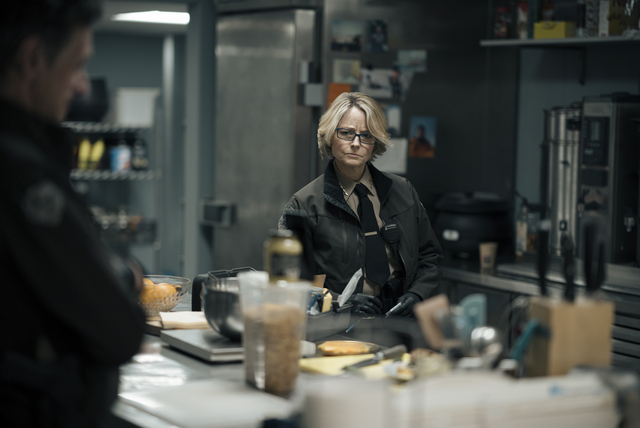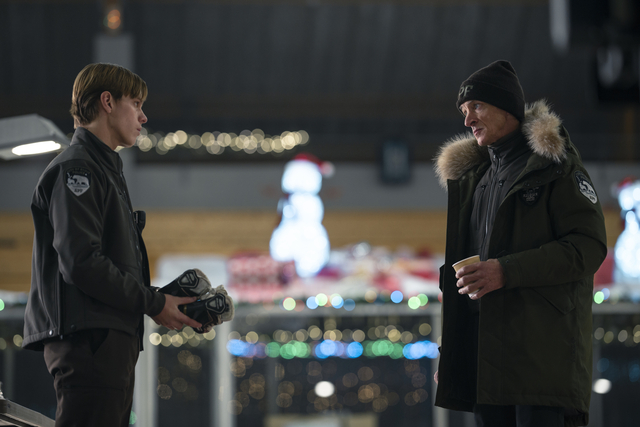Grotesque murders. Jaded yet obsessive cops. A vast, majestic, but terrifyingly extreme rural landscape. The suggestion of a malevolent occult or supernatural presence. Dialogue that is both cryptically philosophical and profane: “It’s a long f-ckin’ night. Even the dead get bored.”
Yes, it’s another season of HBO’s True Detective—one that, in many ways, feels closer than ever before to the anthology’s blockbuster debut. But this fourth installment, premiering Jan. 14 after a five-year hiatus, is also a reinvention, a reawakening, maybe even a rejoinder to everything that preceded it. Subtitled Night Country and directed by the Mexican filmmaker Issa López (Tigers Are Not Afraid), who wrote or co-wrote every episode, it is the first season helmed by a showrunner other than series creator Nic Pizzolatto. While not without its flaws, López’s gorgeously realized story grounds its hardboiled mystery in multidimensional characters, believably immerses viewers in a unique community, and makes a strong case for the continuation of the franchise.

Set 150 miles north of the Arctic Circle, Night Country unfolds in a corner of the United States so rugged and remote, it’s essentially a modern-day frontier. “Welcome to the end of the world: Ennis, Alaska,” reads a sign in the premiere. A seemingly infinite expanse of snow-covered mountains and ice-encased bodies of water surround the cluster of squat buildings that comprises the fictional town. Even when the sun shines, the light López’s camera captures has an eerie, almost unnaturally blue tinge. But the season begins on Dec. 17, the day of the year’s final sunset, as Ennis’ residents prepare for their long annual descent into darkness.
It’s an apt backdrop for a case both sinister and baffling. The small, all-male staff of scientists at a research lab outside of town disappear; the phones and freshly plated sandwiches they leave behind suggest a sudden departure. Days later, they turn up miles away in the icy wilderness, frozen in an obscene heap of naked flesh, faces twisted into expressions of existential horror.

Into this tableau leaps the brusque, misanthropic, self-destructively libidinous local police chief, Liz Danvers (an ideally cast Jodie Foster); her insubordinate, sad-sack deputy, Hank (John Hawkes); and the good-egg, baby-cop son (Finn Bennett’s Pete) Hank barely helped raise. The discovery, in the abandoned lab, of a severed tongue that could only have come from a Native woman draws the attention of Danvers’ nemesis, state trooper Evangeline Navarro (Kali Reis), and revives an unsolved murder case with which Navarro remains preoccupied.
The mismatched-partners dynamic is hardly a new one, for True Detective or its genre. But López shapes Danvers and Navarro into unique foils. An outsider who excels at making enemies, Danvers is on shaky footing in Ennis, professionally and socially. Which doesn’t make life any easier for the rebellious teen stepdaughter (Isabella Star LeBlanc’s Leah) she’s raising. Navarro—like Annie, the young woman whose murder she can’t get out of her head—is part of the region’s Indigenous community, and she cares for her mentally ill sister, Julia (Aka Niviâna). Reis, a boxer who is relatively new to acting, not only holds her own with Foster, but also brings an unaffected quality to a character who refuses to keep her thoroughly justified anger in check. What Navarro and Danvers share, at first, is an urgent need to solve these interconnected cases. As the investigation progresses, that pragmatism evolves into a commitment on the part of two compromised cops to exacting justice on a level more elemental than the law.

With the exception of Hank and Pete, whose tortured father-son relationship alternates between cliché and melodrama (qualities that are only partially mitigated by Hawkes’ and Bennett’s muted performances), the supporting characters feel just as vivid and specific as the two leads. Fiona Shaw, on a hot streak after Killing Eve and Andor, is delightful as a rogue professor living beyond the edge of civilization, who’s first seen gutting a dead wolf with her bare hands. An Indigenous girl butting heads with the white police officer who is her only remaining parent, Leah yearns to connect with her Native neighbors—and finds a way in through a group protesting a mine that has been catastrophic for the community’s health but is integral to Ennis’ economy.
Combined with the show’s conspicuous sympathy for Navarro’s worldview, this expansive cast of characters, each with their own family and backstory and subplots that delve into everything from infidelity to local politics, necessitates a finale that is, at once, messily overstuffed and a bit thematically pat. A supernatural thread that resurfaces throughout the lean, six-episode season is probably element one too many. Yet Night Country is, on the whole, a solid murder mystery.

It’s even better as a reimagining of True Detective that pays tribute to what Pizzolatto created while proving how the series can thrive if other storytellers get a chance to make it their own. In contrast to the gold-hued desert heat and white machismo that defined True Detective’s iconic first season, Night Country is cold, blue, female, attuned to the perspectives of Native women. Where True Detective could be heady to the point of pretension, Night Country is humanistic.
López’s emphasis on the community over the cosmos pays off. Her characters have more heart and depth than those of her predecessor, whose disappointing second and third seasons lacked an antihero as galvanizing as season 1 breakout Rust Cohle (Matthew McConaughey). In fact, in a jarring moment when López puts Cohle’s catchphrase “time is a flat circle” in the mouth of a particularly pathetic Night Country character, the compliment feels backhanded at best. Maybe time is chasing its tail to oblivion, but True Detective has finally escaped the ouroboros.
More Must-Reads from TIME
- Why Biden Dropped Out
- Ukraine’s Plan to Survive Trump
- The Rise of a New Kind of Parenting Guru
- The Chaos and Commotion of the RNC in Photos
- Why We All Have a Stake in Twisters’ Success
- 8 Eating Habits That Actually Improve Your Sleep
- Welcome to the Noah Lyles Olympics
- Get Our Paris Olympics Newsletter in Your Inbox
Contact us at letters@time.com